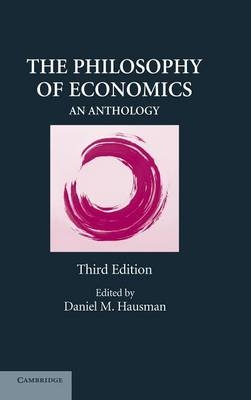
The Philosophy of Economics
Cambridge University Press (Verlag)
978-0-521-88350-4 (ISBN)
An anthology of works on the philosophy of economics, including classic texts and essays exploring specific branches and schools of economics. Completely revamped, this edition contains new selections, a revised introduction and a bibliography. The volume contains 26 chapters organized into five parts: (I) Classic Discussions, (II) Positivist and Popperian Views, (III) Ideology and Normative Economics, (IV) Branches and Schools of Economics and Their Methodological Problems and (V) New Directions in Economic Methodology. It includes crucial historical contributions by figures such as Mill, Marx, Weber, Robbins, Knight, and Veblen and works by most of the leading contemporary figures writing on economic methodology, including five Nobel Laureates in Economics.
Daniel M. Hausman is Herbert A. Simon Professor in the Department of Philosophy at the University of Wisconsin, Madison. He previously taught at the University of Maryland at College Park and Carnegie Mellon University. Most of his research has focused on methodological, metaphysical, and ethical issues at the boundaries between economics and philosophy, and in collaboration with Michael McPherson, he founded the Cambridge University Press journal Economics and Philosophy and edited it for its first ten years. His most important books include The Inexact and Separate Science of Economics (1992), Economic Analysis and Moral Philosophy (co-authored with Michael McPherson, 1996), Causal Asymmetries (1998) and Economic Analysis, Moral Philosophy, and Public Policy (an enlarged second edition of the 1996 book co-authored with Michael McPherson, 2006).
Part I. Classic Discussions: 1. On the definition and method of political economy John Stuart Mill; 2. Objectivity and understanding in economics Max Weber; 3. The nature and significance of economic science Lionel Robbins; 4. Economics and human action Frank Knight; 5. Philosophical foundations of economics: three texts Karl Marx; 6. The limitations of marginal utility Thorstein Veblen; Part II. Positivist and Popperian Views: 7. The methodology of positive economics Milton Friedman; 8. Testability and approximation Herbert Simon; 9. Why look under the hood? Daniel M. Hausman; 10. Popper and Lakatos in economic methodology D. Wade Hands; Part III. Ideology and Normative Economics: 11. Science and ideology Joseph Schumpeter; 12. Welfare propositions of economics and interpersonal comparisons of utility Nicholas Kaldor; 13. The philosophical foundations of mainstream normative economics Daniel M. Hausman and Michael S. McPherson; 14. Why is cost-benefit analysis so controversial? Robert Frank; 15. Capability and well-being Amartya Sen; Part IV. Branches and Schools of Economics and their Methodological Problems: 16. Econometrics as observation: the Lucas critique and the nature of econometric inference Kevin Hoover; 17. Does macroeconomics need microfoundations? Kevin Hoover; 18. Economics in the laboratory Vernon Smith; 19. Neuroeconomics: using neuroscience to make economic predictions Colin F. Camerer; 20. The market as a creative process James M. Buchanan and Viktor J. Vanberg; 21. What is the essence of institutional economics? Geoffrey Hodgson; Part V. New Directions in Economic Methodology: 22. The rhetoric of this economics Deirdre McCloskey; 23. Realism Uskali Mäki; 24. What has realism got to do with it? Tony Lawson; 25. Feminism and economics Julie Nelson; 26. Credible worlds: the status of theoretical models in economics Robert Sugden.
| Erscheint lt. Verlag | 17.12.2007 |
|---|---|
| Zusatzinfo | 1 Tables, unspecified |
| Verlagsort | Cambridge |
| Sprache | englisch |
| Maße | 161 x 229 mm |
| Gewicht | 950 g |
| Themenwelt | Wirtschaft ► Allgemeines / Lexika |
| Wirtschaft ► Volkswirtschaftslehre | |
| ISBN-10 | 0-521-88350-4 / 0521883504 |
| ISBN-13 | 978-0-521-88350-4 / 9780521883504 |
| Zustand | Neuware |
| Haben Sie eine Frage zum Produkt? |
aus dem Bereich


